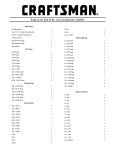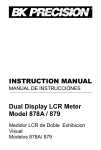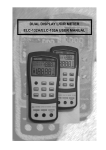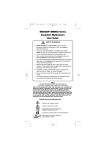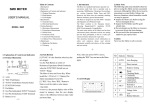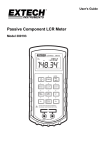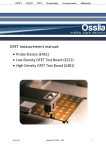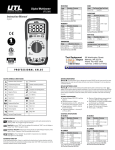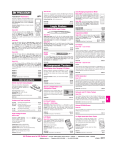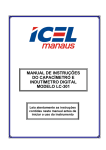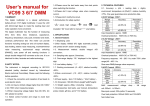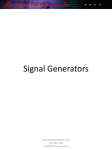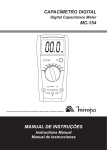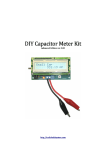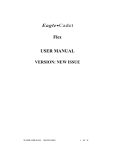Transcript
DIGITAL CAPACITANCE METER OPERATION MANUAL 1.FEATURES Overload protection: Protected by a 0.2A/250V self- fused. The capacitance will lead capacitance may be measured by opening the leads at the trips, recording destroy the meter if the DCV is higher than 60V. the open circuit value and subtracting that value. Zero adjust: limit to 20pF (e) Capacitors, especially electrolytic, often have notoriously wide tolerances. ◇ Easy and correct readout. 3.OPERATION Do not be surprised if the measured value is greater than the value marked on ◇ High measuring accuracy. 3-1, Pannel description: (see the fig.1) the capacitor, unless it is a close tolerance type. However, value is seldom ◇ Measurements are possible even under a strong magnetic field. 3-1-1. LCD: display the measuring value, unit and low drastically below the rated value. ◇ LSI-circuit provides high reliability and durability. battery indication, (f) If changing range, measured value will be changed; leakage-voltage ◇ Input overload protection is provided. 3-1-2. POWER switch: turn on/off the power. ◇ LCD display for low power consumption and clear readout even in 3-1-3. Zero adjust knob: zero adjust knob before the 200nF 2uF 20nF bright ambient light conditions. 2nF 200pF capacitors will be checked also. Leakage-resistance will be decreased in lower 20uF 200uF 2000uF 20mF ◇ In-line pushbuttons allow one hand operation. 3-1-4. Function knob: to select measuring ◇ Light-weight and compact construction for easy operation. 3-1-5. Input COM: Capacity(Cx)COM ◇ Low battery condition is indicated on the LCD display. 3-1-6. Battery case range. 3-4.AUTO POWER OFF measuring of lower than 20nF range range. The meter will be into sleeping mode when it stopped work for 20minutes. Please restart the power if you need to continue to measure. 3-5. MAINTENANCE Do not try to modify the electric circuit. 3-2. Notice before measuring: 3-5-1. Keep the meter away from water, dust and shock. 2-1.GENERAL SPECIFICATIONS 3-2-1. Observe polarity when connecting polarized capacitors. 3-5-2 Do not store and operate the meter under the condition of high temperature, high Display :LCD (Liquid Crystal Display) Max. display 1999. 3-2-2. Discharge completely for any capacitance; Range :9 range, whole range value (from 0.1pF to 20mF) 3-2-3. Do not connect any COM with voltage source absolutely, otherwise it will humidity, combustible, explosive and strong magnetic place. 3-5-3. Wipe the case with a damp cloth and detergent, do not use abrasives and alcohol. Overload protection : Display “1”. 2.SPECIFICATIONS cause damage badly. Calibrate Adjustment :Have two internal adjustment. One is panel Zero 3-2-4. Do not close (black & red) test leads. adjustment. 3-2-5. Before removing the battery and fuse compartment cover, ensure that the :Manual (range:±20pF) instrument is disconnected with any circuit and the power switch is in the off :Display“1”. position. Sampling Time :0~5second 3-2-6. zero adjust won’t work when using the external components alligators if Operating Temp :0℃ to 40℃. Zero Adjustment Over-range dispaly 3-5-4. If do not operate for a long time, should take out the battery to avoid leakage signal displays, should replace the battery following the steps: 3-5-5. When 3-5-5-1. Take off the holster. (see fig. 2) 3-5-5-2 Unlock the screw and remove the battery case. 3-5-5-3. Take out the old battery and replace the new one. It's better to use alkaline battery for longer life 3-5-5-4. Fit on the battery case and lock the screw. 3-5-5-5. Fit on the holster as the opposite way (see fig.2) the capacitance is beyond 20nF. Operating Humidity :80% MAX.R.H. 3-3.CAPACITANCE(C) MEASURING PROCEDURE Battery :9V (6F22 or the equivalent 3-3-1 Press POWER key, turn on the power. Battery Life : alkaline battery: approx.200 hours. 3-3-2 Select the range switch for the maximum expected capacitance. Zinc-Carbon battery approx. 100 hours 3-3-3 Check "0" indication: If test range is 200pF, 2nF, 20nF, should check "0" 200nF Typical consumption current: 3~4mA (RANGE: 200pF-200uF) indication before test. Standard Accessories: Test alligator clips (red & black)…1 pair. 3-3-4 Observe polarity when connecting polarized capacitors. Instruction manual………………..1 pc. 3-3-6 Connect the alligator clips to the capacitors leads. Accuracy is ±(percentage of reading + number of digit) at 23±5℃,<80%RH. 3-3-7 Read the display. The value is direct reading in the electrical unit (pF, nF, Range Resolution Test Frequency Max indication value uF,mF) indicated at the selected range switch. If display show “1”, It indicate on 200pF 0.1pF 800Hz 199.9pF Out-of-Range measurement. If the display indicates one or more leading zeros, 2nF 1pF 800Hz 1.999nF shift to the next lower range scale to improve the resolution of the measurement. 20nF 10pF 800Hz 19.99nF 200nF 2uF 20uF 100pF 1000pF 0.01uF 800Hz 800Hz 80Hz 199.9nF 1.999uF 19.99uF 200uF 0.1uF 8Hz 199.9uF (b) A shorted capacitor will read over-range on all ranges. A capacitance with 2000uF 1uF 8Hz 1999uF low voltage leakage will read over range, or a much higher value than normal. 20mF 10uF 8Hz 19.99mF Accuracy: range at 200pF~200μF: ±0.5%+1 digit; range at 2000μF: ±2%+1 digit; range at 20mF: ±2%+2 digit Excite voltage: 2.8V peak value 2uF 200nF 20uF 20nF 200uF 2000uF 20mF 2nF 200pF 2uF 20uF 200uF 2000uF 20mF 3-3-5.Full discharge any capacitors. 2-2. ELECTRICAL SPECIFICATION Temperature range for the accuracy guaranteed: 23℃±5℃ 20nF 2nF 200pF NOTE: (a) If the capacitance value is unmarked, start with the 200pF range and keep increasing until the over-range indication goes off and a reading is obtained. An open capacitor will read zero on all ranges. (c) Measure of very low capacitance should be performed using extremely short z The specifications are subject to change without totice. z The content of this manual is regarded as correct, error or omits. Please contact with factory. z We herby will not be responsible for the accident and damage caused by improper operation. z The function stated for this User Manual cannot be the reason of special usage. leads in order to avoid introducing any stray inductance. (d) When using the optioned test leads, remember that the leads introduce a measurable capacitance to the measurement. As a first approximation, the test VC6013
